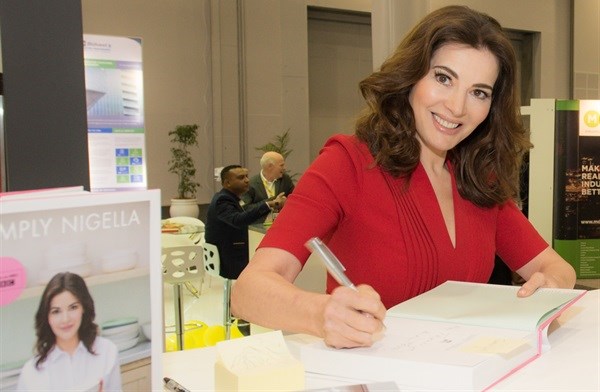#SACSCCongress: Nigella Lawson on the role of food in storytelling

Adamant about not being called a ‘chef’, the former journalist said she felt compelled to write her first book ‘How to Eat: The Pleasures and Principles of Good Food’ in 1998 as a way to speak up for home cooks in a time when food was dominated by professional chefs. Since then she’s gone on to publish ten bestselling books with over 10 million sales worldwide, and has appeared in several hit TV series including Nigella Bites and the most recent Simply Nigella.
London-born Lawson visited Cape Town last week for the SACSC Annual Congress, and during an intimate media briefing she detailed her relationship with food, the appeal of publishing and television as mediums for storytelling, and her thoughts on the linkage between culture and cuisine.
Uncrowned queen of onion soup
Resisting meal times as a child, Lawson’s interest in food only developed when she began fending for herself in university. “I was the queen of onion soup. I used to get huge sacks of onions from the market and then I’d go around to people’s dorms and pick from whatever they had to use a flavourings. Cooking on a budget is a very good way to learn how to cook.
“I also spent my time cooking when I was supposed to be working, same as when I was a journalist. I used to cook because it would help me think about what I was going to write.
“I came from a food-obsessed household, which I kind of resisted for a while and then ended up being worse than any of them. All my family does is talk about food; when they’re eating one meal they’re talking about the one they ate before and the one they’re going to eat next.”
The intimate, emotional language of food
She described her relationship with food as a healthy, happy and slightly obsessive one. “I love thinking about it, I love writing about it, I love cooking it and I love eating it. I would say that it’s a very central part of my life and I enjoy all of its aspects.
“I enjoy the social historical elements of food and how people travelled across the world taking spices along with them. Within families too… the recipes that get passed down. The language of food is very private and it’s beautiful.
“I also feel that we live in our heads a lot and when you’re cooking you’re using your hands and it’s physical work and I love that element of it. At the same time, when you cook you’re doing it to make your friends and family feel happy, welcome, nourished and safe. It’s an emotional language as well as an interesting subject and something that tastes wonderful.”

Writing versus television
Enjoying success in both TV and publishing, Lawson unpacked what she loves most about each medium.
“The appeal of each is very similar, which is essentially having a conversation with people. For me, talking about food and how it fits into life, what I like eating and how I’ve experienced food throughout the years is something I can do in a book and I love doing it in a book. I have written more books than I have made television series. Books are sort of my home.
“Television is quite direct but the voice is the same, it’s just me talking. I think I do television in a way that’s not the standard – I’m not scripted, I use a very small and intimate crew, and there’s only one camera. It isn’t a big production. For me it’s quite important that this feeling of intimate communication with people is maintained.
“One of the reasons that I enjoy TV is because I love the crew; I’ve been with them since 1999 and we’ve grown up a bit together. It’s nice to have that, especially because writing is quite solitary.
“Nevertheless, there’s a purity in things when you’re writing a book. You’re not worried about the camera, or how you look or how it’s going to be filmed. I enjoy doing both, but I would find it hard not to write.”
Sharing uniquely South African narratives around food
Lawson’s advice for promoting South African cuisine is to draw on the country’s melting pot of cultures to tell authentic stories about food and the families eating it.
“There’s a very varied group of people here and a campaign shouldn’t just focus on one type of food but tell everyone’s stories and let everyone’s voices be heard. At a table, everybody should be able to speak and I think that’s a lovely notion.
“You can find lots of South African recipes online but they don’t necessarily convey the feeling of how it fits into the lives of the different families living here. We need to learn about the multiplicity of cooking cultures that exist here instead of being fed a certain cultural focus. It’s distorting and inauthentic and people aren’t getting the real picture, and the picture is such a wonderful one.”



























